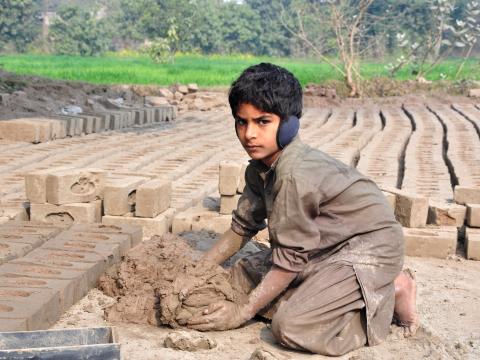A better future is just an illusion for 10-year-old Siddiq

“I can’t work more with you,” Siddiq, 10, tells his mother. “Please give me something to eat.” Although Siddiq works shoulder-to-shoulder with his parents in the brick kiln in Pakistan, it has been months since he has had lunch. His mother’s response to his reasonable request is always the same: “My son, I know you are hungry, but I am unable to provide you lunch at this time. I promise you when we have enough resources, I’ll fulfill your needs.” Her heartfelt answer always gives him courage to continue working through the hunger.
Saddiq’s father, Majeed, began making bricks more than 20 years ago, when he was just a child himself. He works hard to try to provide for his family. “For me, the most important task of my life is just to keep my family alive,” he says. But, because he is illiterate, his options for income generation are few, among them brick kilns and agriculture labour. And, due to the frequent and destructive floods in recent years, more and more illiterate men, and their families, have been forced to work in these factories.
Siddiq and his family used to live in a small home in the village of Khangarth, some 35 kilometers away from where they live now. The floods forced them to move. The change in their location forced Siddiq and his siblings to join their parents in the factory. Siddiq was just 7 years old at the time.
A vicious cycle
There are many reasons for child labor in Pakistan—which studies show affects more than 3 million children—the most common of which is simply the high number of people living in extreme poverty. One breadwinner, especially one with low levels of education, has a very difficult time trying to provide for his family, which is often made up of 7-8 members. And, because culturally and traditionally children often work instead of going to school (especially when parents are not able to afford education) the cycle repeats itself.
Like Siddiq, many children are working in kilns or fields instead of going to school and playing with their colleagues. Siddiq is aware that he is missing out, “I want to read and write,” he says. “Whenever I see my peers going to school, I can’t stop my tears. Once I went to a school and saw how children are being educated there,” he remembers, recalling the closest he has been to getting an education.
It doesn’t matter what the weather is like, Siddiq works in brick kiln with his parents almost nine hours a day. Because of Pakistan’s geographic location, it experiences extreme weather conditions: from one degree Celsius in the winter to 50 degrees Celsius in the summer. It’s cold today, but Siddiq’s only protection from the elements is his ear-cover. He does not have any sweaters.
All in a day’s work
Siddiq assists his parents in making bricks. His duty is to provide prepared clay to his father. The more bricks his father is able to make, the more he is able to earn. The poor payments are evidenced in Siddiq’s pay. “I am earning Rs.20 per day ($0.21).” he says. Oftentimes he will use Rs.5 to buy a biscuit or cadies. The rest, he gives to his parents.
A family affair
Siddiq is not the only child working in his family. In fact, he has six other siblings who also work in the kiln, along with his mother, to help increase the numbers of bricks they can produce in a day. The only one who is not working is his youngest brother, who is just three years old. On a good day, this family makes between 1,000 and 1,500 bricks. They are paid Rs .5 ($.05) per brick. Together, they make between $5 and $7.50 a day—not much for a family of 10.
Siddiq’s mother, Shamim, has also worked in the brick kilns since she was married. She regrets not being able to provide a better environment or future for her children. She is especially concerned about her eldest daughter, Sajima, 16. “I have to arrange marriage of my daughter,” she says. “But still, [I] have not money for her dowry and her marriage is being delayed.”
“I am completely disappointed. Nobody can help us,” she says. “We are poor and that’s why we always have been ignored,” she says, with her eyes were full of tears.
For Siddiq, setting goals for future is a difficult and futile task.
“I haven’t any planning for future because I know it will be not fulfilled,” Siddiq says.
A culturally accepted problem
Malik Mukhtar, the owner of brick kiln realizes that the workers are so poor they often cannot afford the educational expenses of their children. “I always discourage child labour. I think it should be eliminated,” he says. Even so, he often allows children to work in his factory. “The issue is parents want their children to also be paid,” he says. “Most of children working here are students who work only on Saturday and Sunday just to earn their pocket money,” he is quick to add.
World Vision is working in the vulnerable communities in 27 villages of Muzffargarh district of Punjab, through Health, Education and WASH programs to improve the children’s quality of life and prospective for a productive future. Many people in this area have lived in poverty for generations, but after the 2010 floods, things got even worse.
Through World Vision’s programs, mothers and young children are being educated and cared for and the quality and accessibility of education and health is being improved.